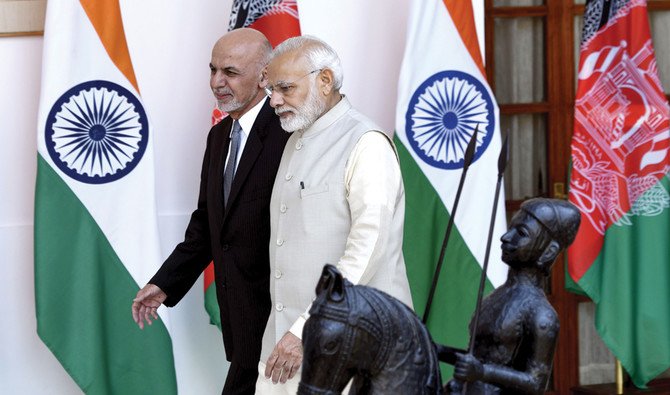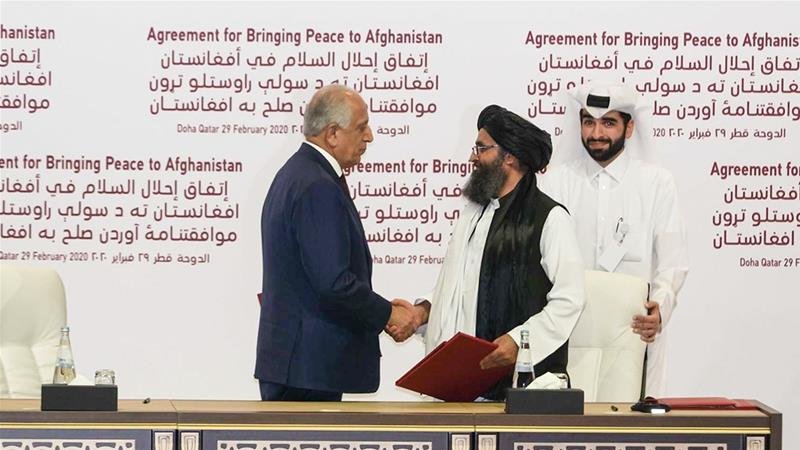Indian Dilemma in Afghanistan

Ever since Washington concluded the historic peace deal, or the “Agreement for Bringing Peace to Afghanistan between the Islamic Emirate of Afghanistan which is not recognized by the United States as a state and is known as the Taliban and the United States of America”, all geopolitical stakeholders are on the qui vive. Major players in the Afghan geopolitical battleground include Russia, China, Pakistan, Iran, and India. The Agreement comes a short time before the 2020 US Presidential election and forms a part of President Donald Trump’s commitment to getting US troops out of Afghanistan’s soil, a key promise he made when he ran for President in 2016. The Agreement impacts all players in different ways, but if it can possibly be the most detrimental to anyone, it may be to India. To understand, one must understand the context of New Delhi’s relationship with Kabul.

The Taliban had historically been anti-India due to India’s support to the Northern Alliance in Afghanistan, and also due to the Taliban’s strong links to Pakistan. The reciprocal relation that Pakistan and Taliban shared had irked India in the past and became one of the most prominent reasons of India distancing itself from the Taliban, something India commits to even today. Taliban’s former conflict with India does not manifestly hold as much today and has not in the recent past. In this situation also, India preferred to keep distance with the Taliban and chose to negotiate with Ashraf Ghani. India’s support to Ghani and his legitimacy is apparent, as India officially recognised Ghani as the victor of recent Presidential elections in Afghanistan.
India does this perhaps out of two reasons – One, a moral choice, that it shall not negotiate with an extremist organisation, and two, because it did not want to cause apprehensions to Ashraf Ghani. Opening talks with Taliban at this point might not be welcome by the elected government in Kabul, which is already displeased it was not invited to be involved in the US-Taliban deal, and because the USA chose to leave Afghanistan and negotiate with Taliban prior to intra-Afghanistan Peace negotiations, rather than after it. India has always regarded the elected government of Afghanistan as the only legitimate negotiator on behalf of Afghanistan. This was made amply clear when recently Official Spokesperson of the Ministry of External Affairs, Raveesh Kumar, in an official statement said that a political settlement bringing peace, security and stability will be supported by India, which is “Afghan led, Afghan owned and Afghan controlled process.” It is a phrase often recurring in official statements New Delhi makes and given its symbolism, it is noteworthy that the US-Taliban Negotiations were neither Afghan-led, nor Afghan-owned, and nor Afghan controlled.

In this context, it can be inferred that India had firmly placed its bet on the elected Afghan government and its democratic legitimacy, notwithstanding its political power in the national and international arena vis-a-vis the Taliban. After the US-Taliban Peace Deal, the Taliban is projected to gain considerable power, control and influence in Afghanistan, and India’s reluctance to engage with the Taliban in Afghanistan may lead to a very unfavourable geopolitical outcome for India. Afghanistan carries immense weight as an important strategic ally, and specifically for India, a crucial regional one. India’s foothold in its neighbourhood has always been its priority. Its diminishing influence in Afghanistan will be a heavy cost India will have to accrue.
The cost is twofold – First, a geopolitical one, given the importance of Afghanistan internationally and regionally. Afghanistan, as a member of the South Asian Association for Regional Cooperation (SAARC), is a key part of the hegemonic role India wants to play in South Asia. Losing grip over the democratic dispensation of Ashraf Ghani can make Afghanistan tilt toward China or Pakistan, two actors India is regularly competing within Asian geopolitics. India should not want to repeat its mistakes it made with its relations with the Nepalese Government, which apparently is inching closer towards China. Losing Afghanistan in the region will be a serious blow to India’s ambitions in the region. Apart from Afghanistan’s role in the SAARC, it’s global strategic importance cannot be discounted and has been proven continuously since events of the “Great Game” between the United Kingdom and Russia during the 19th Century to the Cold War in the 20th Century. A grip or influence over its neighbour will help India while managing and maintaining its balance of powers with global powers Russia, the United States and China alike.
The cost is also, second, an economic one, because India has invested over US$ 3 billion towards economic development, humanitarian assistance, reconstruction and capacity building in Afghanistan, including building its Parliament, on the premise that economic reconstruction and development is crucial for bringing about peace and stability in Afghanistan. Afghanistan also holds importance because of key trade corridors it can open, including the Zaranj-Delaram Highway, built by India, which connects India to Iran, and to Central Asia in general. Added to that is the fact that there is an ever-increasing scope for more bilateral trade and investment. The possibility of the operation of the Chabahar port in Iran would offer a new transit route of Afghan products to India while opening a new route for India, and the rest of the world, for trade with Central Asia – all of which stand to tremendously benefit India.
Security threats such as the Kabul Gurudwara terrorist attack recently in March, undermine India’s motivation to negotiate and engage with the increasingly powerful Taliban. India, in its role as protector of and a stakeholder in concerns of its Sikh and Hindu minority, is stuck in a situation where it keeps on delegitimising a Taliban based polity and keeps supporting a shaky and unstable Afghani democratic polity. Added to that are frequent terror attacks caused by unknown perpetrators. They make matters worse for India, when the Government of Afghanistan blames the Taliban, while the USA blames the ISIS.
In the backdrop of an increasingly powerful Taliban, a situation arises where geopolitical rivals such as Pakistan hold leverage in terms of its association and links to factions of the Taliban, and strong relations with China, massively hurt India’s regional ambitions. Both the Russian and the American outreach with Pakistan is therefore evidently clear when we juxtapose it with the rise of the Taliban. Pakistan’s role in the regional security environment and regional influence is officiated and strengthened also through its induction as a full member in the Shanghai Cooperation Organisation (SCO) in 2017. In September 2018, US Secretary of State, Mike Pompeo visited Islamabad and discussed matters relating to Afghanistan. Following which in December 2018, President Donald Trump in a letter to Pakistan’s Prime Minister Imran Khan, asked for his help and cooperation in deliberations with the Taliban.

In light of such contemporary events, India’s position after the US-Taliban peace deal might not just be weakened, but the position of its geopolitical rivals has clearly been strengthened. Afghanistan is not just India’s hinge in regional politics, it has been and is India’s attempt to provide a model for democratic change and institution building in a conflict-ridden and war-torn country. India lies in a quagmire when it comes to dealing with Afghanistan, and with more than three billion dollars invested, and the geopolitical, cultural and historical influence Afghanistan carries for India, it is nearly impossible to pull out.


















